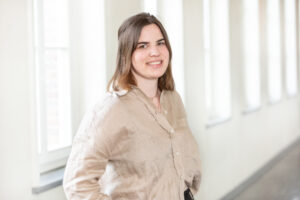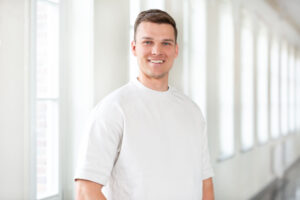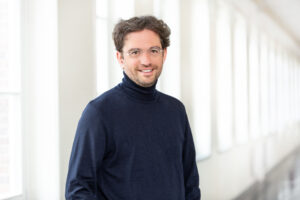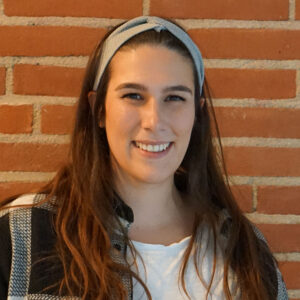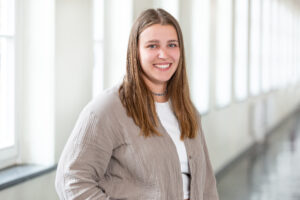PhDs/PostDocs
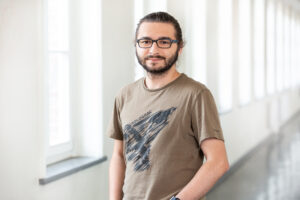
Umut Tank, PhD student Brinkmann lab
Technische Universität Braunschweig (P01)
- umut.tank@tu-braunschweig.de
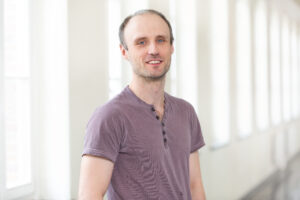
Dr. rer. nat. Thomas Hennig, PostDoc Dölken lab
Medizinische Hochschule Hannover (P02)
- hennig.thomas@mh-hannover.de
I have obtained my BSc in microbiology and virology from the University of Warwick where I also conducted a 1-year practical at Novartis studying neutrophil responses to potential inhibitors of neutrophil functions. After this I gained my PhD from Imperial College London as part of the Wellcome Infection and Immunity programme in the group of Peter O’Hare. There I was focussing on the function of a nuclear localisation signal (NLS) of UL36 during the entry processes of Herpes Simplex virus and how the NLS enables trafficking to the nucleus. Since starting a post-doctoral position in the group of Lars Dölken at the University of Würzburg I have been working on elucidating the mechanisms of induction of read-through transcription and opening of chromatin by the Herpes Simplex virus proteins ICP27 and ICP22, respectively. We now also got interested in the function of the de-ubiquitinating activity of UL36 in interferon stimulated gene expression, a project which I started during my PhD.
In my spare time I play several sports including squash and climbing. The last three years, however, I concentrated on improving my climbing skills with indoor bouldering.
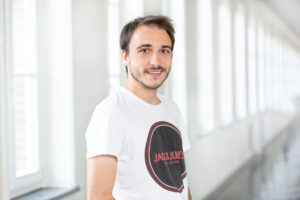
Patrick Fischer, PhD student Dölken lab
JMU Würzburg (P02)
- patrick.fischer@stud-mail.uni-wuerzburg.de
I am a doctoral researcher in the virology department in Würzburg looking into yet another way of how viruses subvert the human immune system. I finished my bachelor and master of biochemistry in Würzburg, where I was also first introduced to virology. There I worked on herpesviruses, which really fascinate me for their incredible evolutionary adaptability to their hosts. I think viruses are a great tool with which we can investigate all kinds of processes in our own cells by seeing how they are disrupted by the virus.
In this research unit, I want to elucidate the role of two human proteins (DTX3L/Parp9) that seem to play a role in the innate immune system as well as in DNA damage. These functions are disrupted by a herpes-viral protein, which we can use to gain insight into the role of DTX3L and Parp9. For this endeavor, we will be using high-throughput sequencing and an exciting tool that allows the rapid degradation of proteins while not fully deleting them.
In my free time I like to do sports like jogging or bouldering or basically everything else where you are active and move around. And if I am not doing that, you can most likely find me reading something.
I am a bioinformatician, interested in the regulation of the immune defense upon virus infection and viral counter-regulation. It fascinates me how viruses adapted to their host and manage to evade many of the highly sophisticated immune defense mechanisms. Analyzing big data sets as well as modeling important biochemical processes interest me since my biochemistry studies at the University of Würzburg.
In this project, I want to find out how the transcriptional bursting kinetics in the immune response are regulated and how herpes simplex virus I modulates them. To achieve this goal, I will model the bursting kinetics and analyze a lot of high throughput data.
In my spare time, I like to play piano and I am always up for a nice walk or hike.
Since the very beginning of my studies in molecular life sciences, I was interested in understanding molecular mechanisms of biological processes, their (epi-)genetic basis, and their regulation on different levels. It fascinates me how small biological entities like viruses interfere with cellular homeostasis and thereby cause severe diseases with fatal consequences. It is truly astonishing which strategies viruses evolved to manipulate cell functions to their advantage and to evade immune responses. Therefore, I have a strong scientific interest in uncovering the causative pathogenic factors and their effects on important cellular functions.
The major aim of our research project is to identify host and viral RNA-binding proteins that play a role during Herpes simplex virus-1 infections. Since RNA-binding proteins are important regulators of gene expression, we want to investigate their action in the context of viral infections.
Outside the lab, I am very passionate about sports and also spend time playing football in a small club.
I am a molecular biologist, and my main research interest are the consequences following the infection of cells, organoids or entire organisms with viruses. Specifically, I investigate the transcriptional and post-transcriptional regulation of gene expression based on high-throughput methods. For Herpes simplex virus 1 (HSV-1), we found a widespread induction of antisense transcripts from the host cell genomes in infected human fibroblasts, which could lead to downregulation of the apoptosis inducer BBC3/PUMA and thus enhance survival. Furthermore, we identified the Nrf2 pathway as a regulator of HSV-1 infection based on single-cell RNA-Seq data. In SARS-CoV-2/COVID-19 research projects, we contributed to investigations into mechanisms of pathogenesis using single-cell RNA-Seq in a wide range of model systems, from cell lines to animal models and patient data. By that, we identified aspects of pathogenic processes such as aberrant activations of macrophages or neutrophils, and inflammatory events in endothelial cells.
Outside work, I enjoy reading, watching films and random low-level outdoor activities.
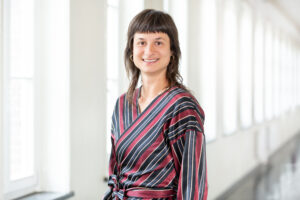
Dr. rer. nat. Veronika Brinschwitz, PostDoc Fischer lab
University Medical Center Hamburg-Eppendorf, UKE (P04)
- v.brinschwitz@uke.de
As a researcher at the interface between structural biology and virology, I have always been interested in the pathogenesis of diseases and the underlying molecular mechanisms. I was able to pursue this interest during my studies of pharmaceutical sciences in Freiburg and Halle (Saale) and to deepen it during my PhD studies in the group of Nicole Fischer in Hamburg. My research focuses on the Merkel cell polyomavirus (MCPyV), a human tumor virus that causes skin cancer. I focus on the viral protein large T-antigen (LT), which is involved in tumorigenesis and plays an important role in the life cycle of MCPyV. I analyze the structural properties of LT and try to relate them to novel biological functions. In the research network I am investigating the interaction between human polyomaviruses and PML-nuclear bodies and how these can be manipulated for viral replication.
Outside of work, I enjoy traveling, being creative, and reading.
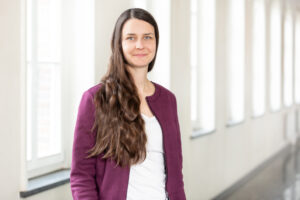
Dr. rer. nat. Manja Czech-Sioli, PostDoc Fischer lab
University Medical Center Hamburg-Eppendorf, UKE (P04)
- m.czech-sioli@uke.de
My research interest focuses on human tumor viruses. I am especially interested how viruses manipulate their host cells and how a persistent viral infection can lead to transformation and development of cancer. I studied Molecular Life Sciences at the University of Lübeck. As a PhD student with Nicole Fischer I investigated the life cycle of Merkel cell polyomavirus (MCPyV), a human tumor virus that is the major cause for a rare but very aggressive type of skin cancer. As a postdoc I used different next generation sequencing techniques to analyze mechanisms of MCPyV integration in the host DNA, a prerequisite for MCPyV induced tumorigenesis. My current research focuses on the interaction of MCPyV proteins with host chromatin prior to viral integration.
In my spare time I like to spend time with my cats and do sports.
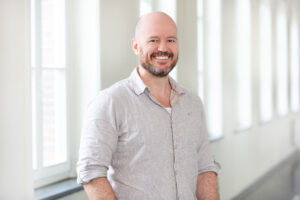
Dr. rer. nat. Thomas Günther, Senior Scientist Grundhoff lab
Leibniz-Institut für Virologie – LIV (P05)
- thomas.guenther@leibniz-liv.de
After graduation in biochemistry and molecular biology at the University of Hamburg, Germany, I joined the group of Adam Grundhoff at the Leibniz Institute of Virology. At that time I already started working on the early chromatinization of herpesvirus genomes with a focus on latent Kaposi’s sarcoma associated herpesvirus (KSHV) infection. During that time, I became interested in polycomb repression of different viruses using comparative approaches. In 2011, I received the doctorate and took the opportunity together with my colleagues to build up the Institute’s next generation sequencing (NGS) facility headed by Adam Grundhoff. In the following years I became an expert in NGS sequencing technologies and acquired deeper skills in bioinformatics. Aside from that I also developed a main interested in high resolution live-cell microscopy. I am now a senior scientist in the research unit Virus Genomics and also took the duties of the radiation protection officer to coordinates the institute’s radiation safety measures.
Main focus of my current research are comparative approaches to investigate general aspects of chromatin acquisition and also host regulation by different viruses, in particular different repression mechanisms using e.g. a wide range of sequencing technologies. As part of my interest in microscopy, I also establish live-cell imaging approaches to visualize viral DNA upon infection in real-time, that allow investigating infections on a single episome/genome level.
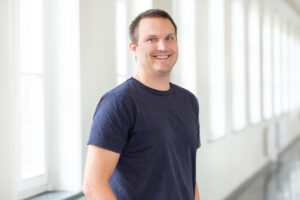
Dr. rer. nat. Simon Weißmann, PostDoc Grundhoff lab
Leibniz-Institut für Virologie – LIV (P05)
- simon.weissmann@leibniz-liv.de
My main interest has always been how chromatin landscapes are shaped by histone modifying enzymes, as well as their contribution to gene transcription. During my doctoral thesis at the BRIC in Copenhagen, I became intrigued how these enzymes can induce altered states of cell identity that support cancer development. I am using my background in chromatin biology to unravel the fascinating and intricate steps of maturation and chromatinization of herpesvirus genomes during the early phase of infection. I think it is especially interesting to understand the many ways in which herpesviruses exploit the host machinery to ensure controlled viral gene expression programs and latency establishment. I am convinced that by comparing strategies of different herpesviruses to direct chromatin regulators of the host cell to their own viral genomes, we will not only learn about their role in the viral life cycle but we will also identify new therapeutic avenues to disrupt viral latency.

Nadine Brückner, PhD student Viejo-Borbolla lab
Medizinische Hochschule Hannover (P05)
- brueckner.nadine@mh-hannover.de
I studied biology at the Leibniz University Hannover, the University of Veterinary Medicine Hannover and the Hannover Medical School (MHH) when I had my first lectures in the field of Virology which captured and held my interest to this day. The use and takeover of host cell machinery by viruses fascinated me so much that my first steps into research were focused on different viral and host protein interactions required for cell entry and replication.
For my research with Prof. Abel Viejo-Borbolla at the MHH, we look further into the latency stage of the life cycle of Varicella-Zoster-Virus. Investigating the establishment and maintenance of latency, we are checking for marks of various histone chaperones and repressed transcription factors while also testing for viral proteins that might inhibit VZV latency.
When not working on my PhD thesis, I like to bake cake or cookies (which I occasionally share with my colleagues), paint or go to the German coast for a long walk on the beach.
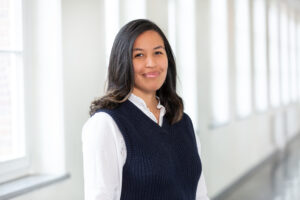
Romina Vargas Ayala, PhD student Virus Genomics Grundhoff lab
Leibniz-Institut für Virologie – LIV (P05)
- romina.vargas@leibniz-liv.de
I am a molecular biologist originally from Peru, trained in France in virology and molecular biology at the IARC of the WHO. I joined the DEEP-DV team in 2021 as an associated PhD student in the Grundhoff lab. Since the beginning of my scientific studies, I became fascinated by the intricate interactions between viruses and their hosts, particularly by the strategies deployed by large DNA viruses like KSHV, which I use as a tool to study chronic viral infections. My PhD project investigates the mechanisms underlying herpesvirus latency, focusing on chromatin silencing and the role of subnuclear compartments and promyelocytic leukemia nuclear bodies (PML NBs). Herpesviruses can establish a latent state in host cells in which they remain dormant for extended periods of time and are reactivated under certain conditions. A key component of latency is epigenetic control of the viral episome, in particular through chromatin modifications that repress viral gene expression.
This project aims to investigate how latent viral chromatin is affected by subnuclear episome localization and association with membraneless nuclear compartments such as PML-NBs. I use advanced molecular biology techniques such as live-cell single-molecule imaging, CRISPR-go technology and ChIP-seq to investigate the spatial dynamics of latent herpesvirus genomes and associated chromatin changes.
Outside of my research, I enjoy learning about ancient history, playing with my chinchillas and dancing, especially salsa.
I started to get curious about how our immune system works in my childhood, and later my research topics were always related to immunology. During my bachelor’s degree in Molecular Biology and Genetics at Istanbul Technical University, Turkey, I worked in an immunology lab and learned about B cells and their response to Helicobacter pylori infection and tumor-associated macrophages. During my graduate studies in Molecular Medicine at Ulm University, I spent four years mainly working on immunomodulation and ubiquitin-proteasome system in hematological malignancies. In my doctoral study, I am excited to explore herpesviruses with Prof. Dr. Benedikt Kaufer and our research group. My current research topic is human herpesvirus 6 (HHV-6), it is like other herpesviruses, a successful pathogen that co-exists with its host species for thousands of years that is based on their ability to undergo two distinct states: the latency and the lytic cycle. HHV-6 efficiently remains latent in its host while spreading from human to human and successfully infecting almost all of us in the first few years of our life. Intriguingly, HHV-6 ensures its genome maintenance during latency by integrating into host telomeres. In our project, we would like to understand how the establishment of latency is orchestrated.and we would like to know whether we can influence the decision between lytic replication and latency of HHV-6.
In my spare time, I enjoy reading fiction and science books, watching various movies and series, doing photography, taking long walks, and hanging out with my friends.
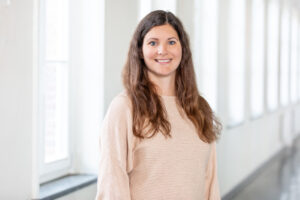
Dr. rer. nat. Myriam Scherer, PostDoc Stamminger lab
Universitätsklinikum Ulm (P07)
- myriam.scherer@uni-ulm.de
After studying molecular medicine at the University of Erlangen-Nuremberg, I started my PhD at the Institute of Virology where I investigated the mechanisms by which effector proteins of human cytomegalovirus (HCMV) counteract intrinsic and innate immune defences. Since I was very impressed by the diverse strategies that herpesviruses have evolved to efficiently overcome cellular immune mechanisms, I continued working on restriction factors and viral antagonists during my postdoc in Erlangen and afterwards in Ulm. My current research focuses on the ways of how PML nuclear bodies – these are very dynamic multiprotein structures in the cell nucleus and it’s fun to study them by fluorescence microscopy – inhibit different steps of HCMV infection.
Outside the lab, I enjoy going up the mountains for skiing or down the ocean for scuba diving as well as trying out new bars and restaurants in Ulm together with my great colleagues.
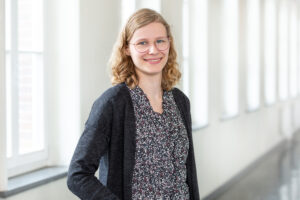
Ilka Simons, PhD student Schreiner lab
Medizinische Hochschule Hannover (P08)
- Simons.Ilka@mh-hannover.de
Adenoviruses are the most dominant viruses in my research life. During my master studies in molecular biotechnology at the Technical University of Munich, my fascination for viruses and the interplay with the host cell arose during several lectures on different virology topics. In my master’s thesis, I got in first contact with the wonderful world of epigenetics and its role during DNA virus infections. This encouraged me to do my PhD thesis at the Hannover Medical School in Sabrina Schreiners lab. Here, I investigate the maintenance and persistence of Human Adenovirus influenced by host restriction factors. My focus is concentrated on the elucidation of the viral switch from early to late gene expression and its role during viral persistence.
In my spare time, I enjoy baking bread and cakes and really love to be outside in the nature for some sports or just relaxing in the sun.
My research life as a virologist started as a master’s student at the Technical University of Munich investigating the modulation of human Adenovirus productive infection by distinct PML isoforms. Fortunately, during my PhD thesis I was able to combine my interest for epigenetics with my newly evolved fascination for human Adenoviruses. As a PhD student with Sabrina Schreiner, I studied the role of the chromatin-associated proto-oncogene DEK in the modulation of the host and adenoviral genome, whereas we could provide new target molecules for novel therapeutic strategies. During my postdoc at the Hannover Medical School, I will further investigate the regulation and posttranslational modification of epigenetic factors during human Adenovirus infection to gain novel insights on early stages of viral gene expression, latency and the virus-mediated oncogenesis.
In my spare time, I like to go hiking and most of all going to concerts, travelling and spending my evenings with friends and family with good food.
- julia.mai@uniklinik-freiburg.de
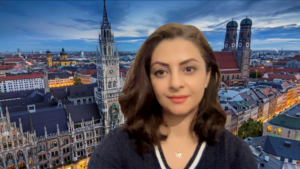
Maryam Karimi, PhD student Schreiner lab
Medizinische Hochschule Hannover (P08)
- maryam.karimi@helmholtz-muenchen.de
During my internship in Prof. Schreiner’s group, the viruses and their characteristics and the different ways they can use to manipulate and reprogram the human immune system, piqued my curiosity to learn more about viruses. This interest in viruses motivated me to start my PhD in the virology department at the Technical University of Munich (TUM). In our research group, I am trying to find out the underlying mechanism and interplay between host and adenovirus proteins. During my PhD, I investigate how a complex in our body, which has a role in repressing genes to maintain the integrity of the genome, can play an antiviral role during human adenovirus (HAdV) infection and the methods adenovirus uses to overcome this antiviral host factor. To reach the goal of my project, I am investigating the interaction partners of the above-mentioned complex subunits with HAdV proteins.
In my spare time, I enjoy spending time with good friends, hiking in the Alp mountains, or riding a bike in nature with my husband.

Enrico Caragliano, PostDoc Bosse lab
Center for Structural Systems Biology, CSSB (P09)
- enrico.caragliano@leibniz-liv.de
I am a molecular biologist and virologist by training. I am interested in studying the formation of virally induced compartments and the interplay between cellular and viral factors in their formation. My interest in studying Herpesviridae started while performing my master thesis at Messina. At that time, I was investigating the role of a viral protein in the modulation of apoptotic pathways during Herpes Simplex Virus 1 (HSV-1) infection. As an intern at the University of Rijeka in the department of Prof. Stipan Jojnic, I worked on a murine congenital infection model of Human cytomegalovirus (HCMV). In 2018, I started my PhD at the Leibniz Institute for experimental virology (HPI) in Hamburg, working on a joint project between Jens Bosse´s and Wolfram Brune´s labs on HCMV replication compartments (RCs). Now I am continuing my thesis work at the Center for Structural Systems Biology (CSSB) in Hamburg. I investigate how HCMV can exploit liquid-liquid phase separation (LLPS) to form its RCs directly at the viral genome, ensuring its replication. Specifically, we are interested in understanding the molecular composition of the compartment using cutting-edge live microscopy approaches and novel cross-linking methods.
During my free time, I like to cycle in the surrounding of Hamburg, playing video games and reading historical books.
Since school I have loved science and languages. Computer language has also always fascinated me and I wanted to know how it works. The bioinformatics presentation at the LMU’s Open Day showed me how interesting and exciting interdisciplinary science actually is and finally convinced me. That is how I became a bioinformatician. During my studies I learned all the necessary basics from computer science and life sciences. In my bachelor thesis, I entered the field of proteomics and dealt with peptide identification. In my master’s thesis, I studied how data analysis decisions affect the robustness of scientific results. This experience revealed how important correct handling of biological data is. As a graduate student, I have begun to study herpes simplex virus 1 (HSV-1) infection. Here, I am investigating the effects of viral disease primarily at the transcriptional level. In this project, I will extend the analysis to the chromatin level to find out which host cell mechanisms are manipulated by the virus and what the effects are. This may help to better understand the arms race between viruses and immune defenses.
Outside of work, I am drawn to sports (from fitness to ball sports to swimming). This is my perfect balance to sitting in front of the computer for long periods of time.

Dr. rer. nat. Nicole Andrée-Busch, PostDoc Brinkmann lab
Technische Universität Braunschweig
Scientific coordinator FOR5200
- nicole.andree@deep-dv.org
During my biology studies at the Technische Universität Braunschweig, I became interested in the fascinating interplay between pathogen and host. Already in my bachelor thesis and during a stay abroad at the Forestry and Agricultural Biotechnology Institute (FABI) of the University of Pretoria in South Africa, I dealt with various plant pathogenic fungi, and in my master thesis at the Julius Kühn Institute with plant pathogenic viruses. For my PhD, I switched to the field of genetics and worked on the process of pre-mRNA splicing in fission yeast. In Melanie Brinkmann´s group I am diving deeper into the exciting field of virus-host interactions and how herpesviruses manipulate their host’s immune system to establish lifelong infections. Besides planning and conducting experiments in the lab and supervising theses, I am involved in teaching by giving lab courses and lectures. As scientific coordinator of the DEEP-DV research unit, I am responsible for the scientific administration of this group. This position allows me to combine the exciting research in the lab with project management and public outreach.
In my free time, I enjoy being active in our garden and spending time outside in nature with my horse Donatello (‘Dickie’).
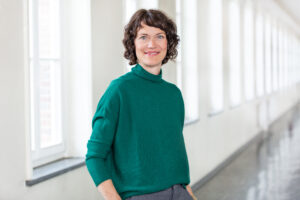
Dr. rer. nat. Denise Heim, PostDoc Fischer lab
University Medical Center Hamburg-Eppendorf, UKE
Scientific coordinator FOR5200
- denise.heim@deep-dv.org
After completing my degree in biology at the university in Kiel, I came to Hamburg for my PhD and studied the molecular mechanisms of inflammation-associated liver cancer development at the I. Department of Medicine, University Medical Center Hamburg-Eppendorf. I then left academic research and joined a molecular diagnostics company. A start-up that emerged from the Johns Hopkins University environment and whose core competence is liquid biopsy for the detection of tumor DNA in blood. After a few years in industry, my professional path has led me back to UKE. In the diagnostic laboratory of the Institute of Medical Microbiology, Virology and Hygiene, I am supporting the implementation of the IVDR guidelines according to the EU regulation for in vitro diagnostics. I am also taking care of improving the general quality management in all areas of the diagnostic lab. I particularly enjoy establishing new innovative molecular diagnostic methods. In the DEEP-DV research group I am responsible for the scientific administration, whereby public relations is a new exciting task for me.
In addition to my professional tasks, I am interested in yoga philosophy and I try to deepen my spiritual practice while traveling through Asia, my favorite continent.

